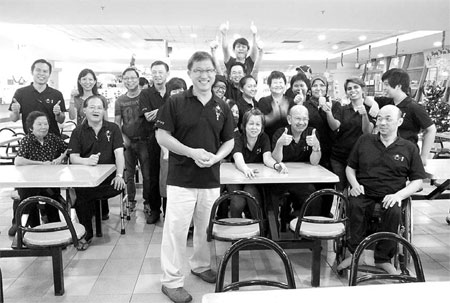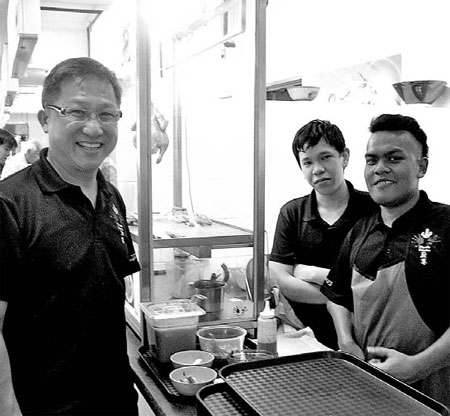Dishing out dignity
Updated: 2013-04-14 08:02
By Jaime Koh(China Daily)
|
|||||||
|
For Koh Choon Seng, setting up Dignity Kitchen has been challenging and the biggest one which Dignity Kitchen still faces today, is perception. Photos Provided to China Daily |
|
Dignity Kitchen provides training to the disabled and the disadvantaged so that they are able to operate food stalls. |
A management consultant and restauranteur, Koh Choon Seng probably never expected Dignity Kitchen to bleed for so long. Despite that, he tells Jaime Koh that he is happy to be able to help the disadvantaged.
Fourteen months into operation, Dignity Kitchen in Singapore is still in the red. Its average monthly loss is a five-figure sum and any other investor or business owner would have shut it down to stem the bleeding. But Dignity Kitchen is not just another food business and its boss, Koh Choon Seng, is not just another businessman.
Dignity Kitchen is a social enterprise first, and business second. The return on investment, for Koh, is not in terms of dollars and cents, but in the progress of his staff and the smiles on the faces of those elderly who come to Dignity Kitchen for their treats.
Dignity Kitchen is a food court management school focusing on the training of the disabled and the disadvantaged to be food stall operators.
Workers and trainees at Dignity Kitchen are considered "unemployable" in the conventional marketplace - the deaf and dumb, the blind, the elderly, those suffering from depression, Down Syndrome and the handicapped. Among Koh's trainees and workers are also those who suffer from Parkinson's Disease and kidney dialysis patients.
It is not easy training these people, Koh admits.
Instructions, standard operating procedures, and rules are all clearly written and displayed all over the work area. This constant visual reminder makes it easier for the trainees and workers to remember, and Koh says it also helps them see the big picture and plan their work for the day.
Koh pairs every disabled trainee and worker with an able-bodied one to help them along. "They won't be able to work on their own otherwise," he says.
Koh himself wears a few hats. In addition to being executive director at Project Dignity Pte Ltd (which runs Dignity Kitchen), Koh is also visiting professor entrepreneurship at S P Jain Center of Management and managing consultant at Christopher Benjamin Consultancy Services.
The management consultant was formerly executive director at Restaurant Association of Singapore, senior manager at Coopers & Lybrand Consultant and foundry manager at William Cook PLC.
Setting up Dignity Kitchen has been challenging, to say the least. Among the challenges include fund raising, building a reliable team, cash flow and scouting for a suitable location. But the biggest challenge of all, which Dignity Kitchen still faces today, is perception.
Koh recounts the early days of Dignity Kitchen. "I had my staff wearing badges that say "I am deaf", or "I am blind" or "I have Down Syndrome". I thought it would make the customers more understanding of their individual situation.
"But business was bad. I decided to remove the badges. After that, sales went up," Koh says, shaking his head.
"The public still has a negative perception of these people. But once you remove the labels, there's nothing to tell the public about who these people are, the stigma is removed," Koh says.
In addition to providing an opportunity for the disabled and disadvantaged to earn their independence, Dignity Kitchen also provides daily lunch treats for the elderly, from the various homes in Singapore. After a tour of the city, which Dignity Kitchen arranges, the groups stop by for lunch.
"The only condition I have is that the old folks must enjoy themselves and they must eat their fill," Koh says.
It is not unusual for Koh to fork out money for these activities. Instead of securing sponsorships for these activities first, he arranges them first before seeking sponsorship.
"Some months, I may be able to get 80 percent sponsorship, other months, maybe less than 50 percent," Koh says. Still he insists on doing it.
"It's not the money. For many of these old folks, it's probably the only time they get to leave the home and see Singapore," he says. Some of them have not been out of their houses for years.
Koh was beaming when he told China Daily that the loss for the previous month was "only about S$6,000 ($4,847)". "I'll be able to break even in June," he says.
Unable to get funding for its initial set up, Koh has invested about S$600,000 of his own money to keep Dignity Kitchen going.
Koh had wanted to call it quits some time back, but when he saw how the disabled children and their parents had benefited from Dignity Kitchen, he persevered. Today, Dignity Kitchen has several corporate sponsorships for its social projects.
His noble effort has been recognized. He has been asked to replicate this project in China. In the second half of this year, Koh will be traveling to Hong Kong and Taiwan to share his experience in setting up Dignity Kitchen with several corporations and universities. The Hong Kong Jockey Club has already expressed interest in the idea.
If Koh had ended the project, 19-year-old Tan Jian Ning and his mother would have found it harder to accept their situation.
Tan has Down Syndrome and is a naturally withdrawn child. But since starting work, manning the "Mama Stall" selling books and knick-knacks at Dignity Kitchen, Tan has come out of his shell.
"He is now more willing to take the first step and greet customers," his mother says. "He is also more willing to interact with people and to talk, even though he may not be very articulate," she says.
If not for Dignity Kitchen, Tan would probably be spending most of his adult life in a center for people with similar issues. "He'll have less exposure to the outside world, and he'll be in his shell all his life," says his mother.
For Koh, setting up Dignity Kitchen is less about teaching the disabled how to fish, but giving them back their dignity.
"It is not right for the elderly to be cleaning toilets or dirty dishes, or be treated like useless people. It is not right for disabled people or people with health issues to be shunned. They are humans too, and they should be accorded the dignity that 'normal' people get," he says.
"I cannot save the world, but I can help one person at a time," he says.
Contact the writer at sundayed@chinadaily.com.cn.
(China Daily 04/14/2013 page4)

